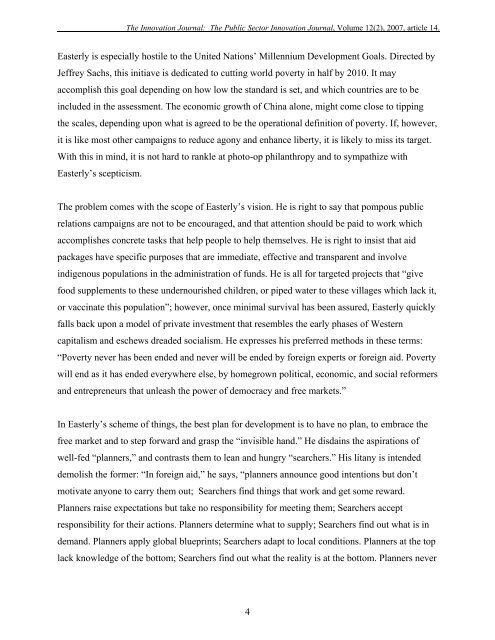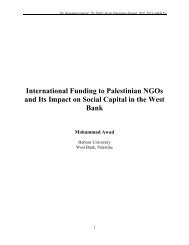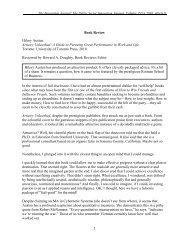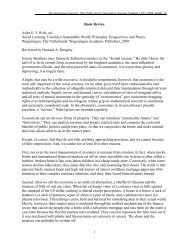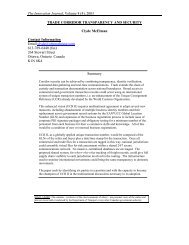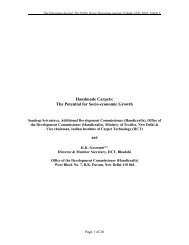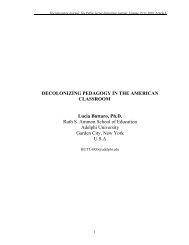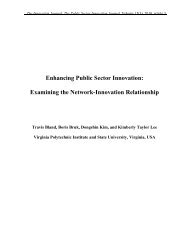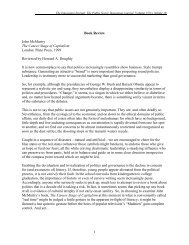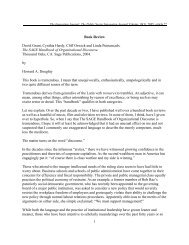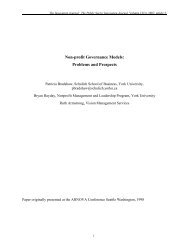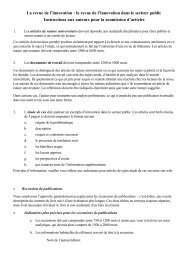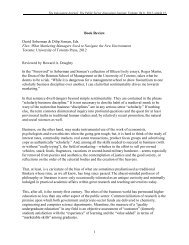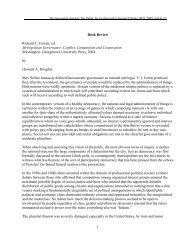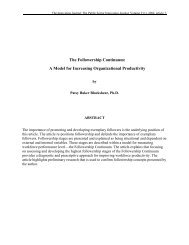William Easterley, White Man's Burden - The Innovation Journal
William Easterley, White Man's Burden - The Innovation Journal
William Easterley, White Man's Burden - The Innovation Journal
Create successful ePaper yourself
Turn your PDF publications into a flip-book with our unique Google optimized e-Paper software.
<strong>The</strong> <strong>Innovation</strong> <strong>Journal</strong>: <strong>The</strong> Public Sector <strong>Innovation</strong> <strong>Journal</strong>, Volume 12(2), 2007, article 14.<br />
Easterly is especially hostile to the United Nations’ Millennium Development Goals. Directed by<br />
Jeffrey Sachs, this initiave is dedicated to cutting world poverty in half by 2010. It may<br />
accomplish this goal depending on how low the standard is set, and which countries are to be<br />
included in the assessment. <strong>The</strong> economic growth of China alone, might come close to tipping<br />
the scales, depending upon what is agreed to be the operational definition of poverty. If, however,<br />
it is like most other campaigns to reduce agony and enhance liberty, it is likely to miss its target.<br />
With this in mind, it is not hard to rankle at photo-op philanthropy and to sympathize with<br />
Easterly’s scepticism.<br />
<strong>The</strong> problem comes with the scope of Easterly’s vision. He is right to say that pompous public<br />
relations campaigns are not to be encouraged, and that attention should be paid to work which<br />
accomplishes concrete tasks that help people to help themselves. He is right to insist that aid<br />
packages have specific purposes that are immediate, effective and transparent and involve<br />
indigenous populations in the administration of funds. He is all for targeted projects that “give<br />
food supplements to these undernourished children, or piped water to these villages which lack it,<br />
or vaccinate this population”; however, once minimal survival has been assured, Easterly quickly<br />
falls back upon a model of private investment that resembles the early phases of Western<br />
capitalism and eschews dreaded socialism. He expresses his preferred methods in these terms:<br />
“Poverty never has been ended and never will be ended by foreign experts or foreign aid. Poverty<br />
will end as it has ended everywhere else, by homegrown political, economic, and social reformers<br />
and entrepreneurs that unleash the power of democracy and free markets.”<br />
In Easterly’s scheme of things, the best plan for development is to have no plan, to embrace the<br />
free market and to step forward and grasp the “invisible hand.” He disdains the aspirations of<br />
well-fed “planners,” and contrasts them to lean and hungry “searchers.” His litany is intended<br />
demolish the former: “In foreign aid,” he says, “planners announce good intentions but don’t<br />
motivate anyone to carry them out; Searchers find things that work and get some reward.<br />
Planners raise expectations but take no responsibility for meeting them; Searchers accept<br />
responsibility for their actions. Planners determine what to supply; Searchers find out what is in<br />
demand. Planners apply global blueprints; Searchers adapt to local conditions. Planners at the top<br />
lack knowledge of the bottom; Searchers find out what the reality is at the bottom. Planners never<br />
4


